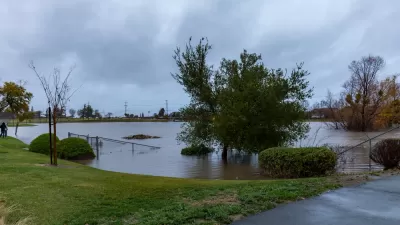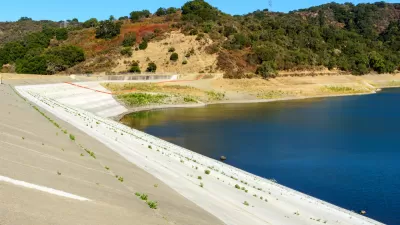Checking in with the level of participation from California water districts in efforts to conserve water a few months removed from an average rain year once predicted to deliver El Niño-sized excess.

Paul Rogers reports that given the opportunity to volunteer for conservation measures, California water districts have mostly chosen to return to the status quo in the wake of the historic drought that eased after this year's winter and spring rainy season.
Rogers first provides the background: "Under fire from water agencies who were losing millions of dollars in lost water sales, Gov. Jerry Brown's administration two months ago dropped all mandatory water conservation targets and allowed cities, water districts and private water companies across the state to set their own targets."
The results of the exercise revealed very few districts willing to participate in a conservation program. "343 urban water agencies -- or 84 percent of the 411 largest in the state -- gave themselves a conservation target of zero for the rest of this year," reports Paul Rogers.
Felicia Marcus, chairwoman of the State Water Resources Control Board, is quoted in the article claiming that the actions by the state's water districts demonstrates their preparation for an ongoing drought. The Water Resources Control Board recently "required each water provider to pass a "stress test" that demonstrated it had enough water either in reservoirs, groundwater storage or contracts with other agencies to get by in case the drought continues for another three years."
FULL STORY: California drought: 84 percent of water agencies choose zero as conservation target

Planetizen Federal Action Tracker
A weekly monitor of how Trump’s orders and actions are impacting planners and planning in America.

Chicago’s Ghost Rails
Just beneath the surface of the modern city lie the remnants of its expansive early 20th-century streetcar system.

San Antonio and Austin are Fusing Into one Massive Megaregion
The region spanning the two central Texas cities is growing fast, posing challenges for local infrastructure and water supplies.

Since Zion's Shuttles Went Electric “The Smog is Gone”
Visitors to Zion National Park can enjoy the canyon via the nation’s first fully electric park shuttle system.

Trump Distributing DOT Safety Funds at 1/10 Rate of Biden
Funds for Safe Streets and other transportation safety and equity programs are being held up by administrative reviews and conflicts with the Trump administration’s priorities.

German Cities Subsidize Taxis for Women Amid Wave of Violence
Free or low-cost taxi rides can help women navigate cities more safely, but critics say the programs don't address the root causes of violence against women.
Urban Design for Planners 1: Software Tools
This six-course series explores essential urban design concepts using open source software and equips planners with the tools they need to participate fully in the urban design process.
Planning for Universal Design
Learn the tools for implementing Universal Design in planning regulations.
planning NEXT
Appalachian Highlands Housing Partners
Mpact (founded as Rail~Volution)
City of Camden Redevelopment Agency
City of Astoria
City of Portland
City of Laramie





























